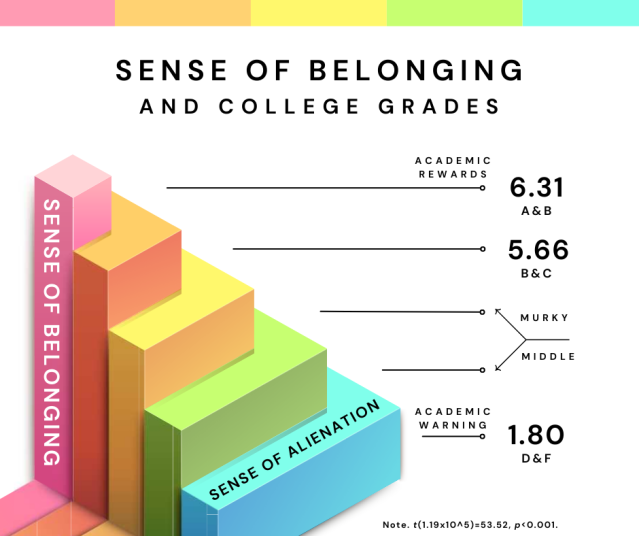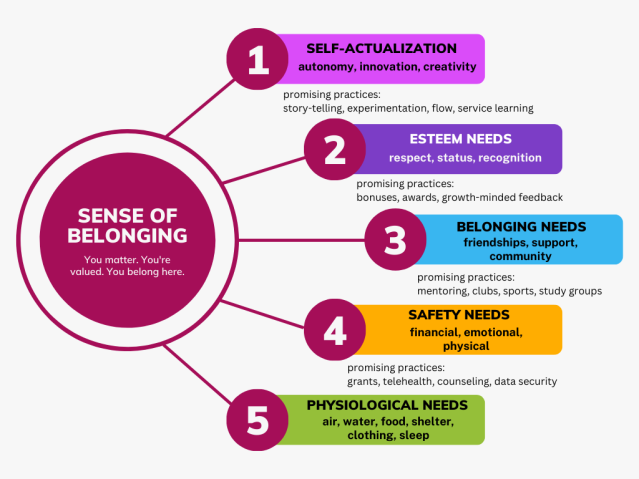Education
Belonging, Learning, and the Brain
Fostering a sense of belonging at school is good for students—and their brains.
Posted June 5, 2023 Reviewed by Devon Frye
Key points
- Sense of belonging is a basic need, fundamental motive, and human right, particularly important in education.
- Sense of belonging refers to feeling accepted, valued, respected, and included, just as we are.
- Sense of belonging produces positive gains including better grades, attendance, engagement, and retention.
- Belonging strengthens brain connectivity and catalyzes neurotransmitter release, with positive effects.
The importance of fostering a sense of belonging in educational learning spaces cannot be overstated. Research has shown that students who feel a strong sense of belonging in these environments are more likely to be cognitively, affectively, and behaviorally engaged, confident, and successful in their academic pursuits. In this article, we will explore the benefits of fostering a sense of belonging in K-12 and college classrooms and laboratories, and how feelings of belonging positively affect the brain through the neurotransmitters serotonin, dopamine, and oxytocin.
What Is Sense of Belonging?
Let’s start with a definition of sense of belonging. It refers to the feeling of being accepted, valued, respected, and included in a particular group or community, just as you are (Strayhorn, 2019).
In educational contexts, it means feeling like a part of the class, sports team, living-learning community, or lab group. It is a shared faith that one’s needs will be met by the organization and other members of the group through a mutually beneficial commitment to being together.
When students feel like they belong, they are more likely to participate in discussions and activities, attend class regularly, collaborate on projects, stay in school, and seek out help when they need it. Figure 1 (below) presents data from an exploratory analysis conducted for my address, showing a significant correlation between students' sense of belonging and academic grades. As the figure shows, students who lack a sense of belonging (i.e., alienation) are much more likely to be placed on "academic warning," compared to peers with a strong sense of belonging who are well-positioned to earn academic awards and scholarships.

Fostering students’ sense of belonging in educational environments yields numerous benefits. Previous research, some of which is my own, has shown that students who feel like they belong are more likely to be engaged academically, involved socially, and motivated both intrinsically and extrinsically, among other positive outcomes.
They are more likely to show up on time, participate actively in discussions and group activities, and less likely to worry about being prejudged or treated like a stereotype. Students who feel a sense of belonging are also more likely to have a positive attitude toward their academic pursuits, which leads to better performance, higher retention, and greater success—and, yes, they are more likely to go on to be engaged and generous alumni.
Sense of Belonging and the Brain
Another important benefit of fostering a sense of belonging in educational settings is the impact it has on the brain. Studies shed light on the neural correlates of social participation and belonging.
For example, one study analyzed magnetic resonance imaging (MRI) data from 40,000 people in the United Kingdom. Researchers found that regular attendance and engagement in social clubs and related activities produced wide-ranging deviations in intranet work connectivity, as well as within-network function connections. Specifically, results showed that volume variations in the default mode network and limbic network were associated with participation in social activities such as religious groups, sports teams, and social clubs.
Applied to education, when students establish trusting relationships with teachers, make friends with accepting peers, cooperate in purposeful learning exercises, and join registered student organizations, they activate regions of the brain associated with stress reduction, openness, and happiness. The same is true for Black students who enjoy experiencing "a home away from home" in campus cultural centers and LGBTQIA+ students in gay-straight alliances in high schools or resource centers in college. All of this can serve as a buffer against sickness, depression, and disease.
Feeling like one belongs through strong, supportive social connections activates reward-related regions of the brain (e.g., ventromedial prefrontal cortex) and triggers the release of “feel good” neuropeptides (or transmitters) such as serotonin, dopamine, and oxytocin. Oxytocin is generally defined as a natural hormone produced by the hypothalamus that has a range of positive effects on one’s mental, physical, and emotional health. Not only is it released when certain regions of the brain are activated, but it is also stimulated by trusting touches, hugs, spoken affirmations, and close bonds.
And not only does it enable or strengthen neuron connectivity—a core element of neural health that powers lightning-fast communication among different brain functions—but it also promotes feelings of bonding, trust, and connection with others. Studies have shown that increased levels of oxytocin in the brain are linked to enhanced feelings of social connection and belonging. It is activated when students form and enjoy strong, positive relationships with faculty mentors, play safely with peer teammates, share space in living-learning communities, or learn from culturally responsive educators who care about them and their academic success.
Sense of Belonging, Learning, and the Brain
The release of these neurotransmitters in response to a sense of belonging has been shown to have numerous positive effects on the brain and body. For example, it can reduce stress and act as a buffer against anxiety and depressive symptoms. Medical research shows that having a friend present during a serious procedure lowers physiological measures of stress, worry, and fatal thoughts. It also increases executive functions and decision-making.
Positive support from others stimulates neuropeptide release that reduces stressful neural responses associated with bandwidth exhaustion and burnout among physicians, nurses, and frontline workers, according to scientific data. Cognitive science and mental health studies have shown that elevated levels of stress-reducing neurotransmitters like oxytocin can significantly improve mood, enhance learning and boost memory retention, which, in turn, promotes overall well-being. Figure 2 (below) presents a graphical illustration of these positive outcomes, along with promising practices for achieving them in education.

Conclusion
Fostering a sense of belonging in educational learning spaces is vital for creating a positive and engaging environment that promotes student success. Not only does it improve academic outcomes, but it also has numerous positive effects on mental and emotional well-being through the activation of reward-related regions of the brain and the release of positive neurotransmitters like oxytocin, which enables neural connectivity, brain function, and overall well-being.
Creating an inclusive and supportive learning environment where students feel valued, accepted, and superbly supported will set them up for success both academically and personally. It also benefits their brain and that, dear friends, is the bright line of connection between sense of belonging, learning…and the brain.
insights for this blog were drawn from my recent keynote address at the 2023 Learning & The Brain (L&B) Conference held in New York City. Special thanks to the conveners and planning committee for the opportunity to share my voice on these issues using examples drawn from my current and ongoing funded research. For more, check out The Belonging Lab.
References
Strayhorn, T. L. (2019). College students' sense of belonging: A key to educational success for all students (2nd ed.). New York: Routledge.




